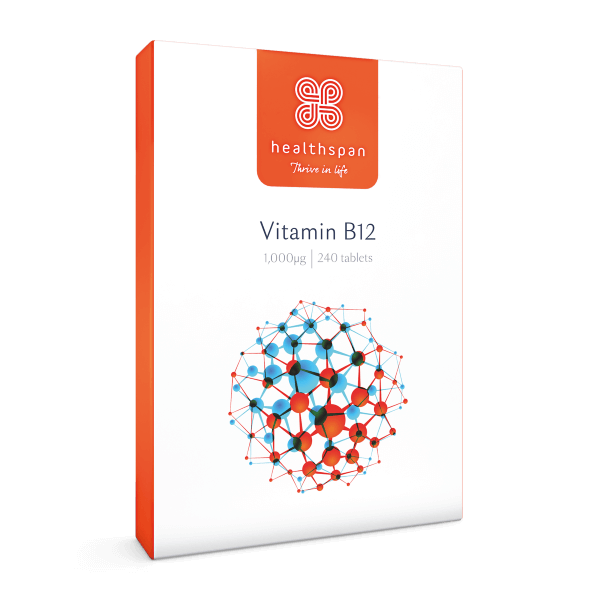The eight B vitamins can help your immune system, as well as the heart, brain, skin, hair and eyes. Here's what they do and what happens when you're deficient.
🕒 9 min read
What are the B vitamins?
The B vitamins are a group of eight vitamins that work together to support the health of our heart, brain and immune system, as well as skin, hair and vision. They are vitamin B1 (thiamine), B2 (riboflavin), B3 (niacin), B5 (pantothenic acid), B6 (pyridoxine), B7 (biotin), B9 (folate/folic acid) and B12 (cyanocobalamin).
B vitamins often occur naturally together in foods. Because they are water-soluble, however, our bodies cannot store them. For this reason we need to get a regular supply from our diet or, if we can't get enough or have problems with absorption, from vitamin B supplements or tablets.
Wondering why there are gaps in those numbers? Four nutrients once classed as B vitamins are no longer considered vitamins – defined as nutrients needed for growth and health that our bodies cannot produce themselves. These are vitamins B4 (adenine), B8 (inositol), B10 (PABA), and B11 (salicylic acid).
B complex vitamins
As well as performing the same or similar roles in our bodies, B vitamins often enhance and complement each other's actions. That's why it's important to eat a varied diet, and when choosing a supplement to opt for a vitamin B complex containing all eight B vitamins.
Three other nutrients – choline, inositol and para-amino-benzoic acid (PABA) – are often included in vitamin B complex supplements because they work closely together.
What do B vitamins do?
B vitamins act in many different ways to keep us healthy in body and mind. One of their most important activities is to help our cells produce energy, by breaking down the three macronutrients protein, fat and carbohydrate. In fact, one or more B vitamins are involved in every single energy-producing reaction of our cells.
B vitamins are also vital for the manufacture and repair of DNA and RNA, the molecules that carry the instructions for our bodies to make the proteins we need to live. They are also involved in helping switch genes on and off.
B vitamins and the immune system
B vitamins are vital for a healthy immune system. Specifically, they help ensure immune cells have the energy needed to fend off infections, combat inflammation and oxidative stress, help maintain a healthy gut, activate immune cells involved in fighting off infections, reduce inflammation and aid tissue repair.
B vitamins and the brain
B vitamins also play a key role in the health of the brain and nervous system. A 2016 review concluded that 'adequate levels of all [B vitamins] are essential for optimal physiological and neurological functioning.'
Research is uncovering many intricate connections between the immune and nervous systems. B vitamin deficiency is linked with a higher risk of cognitive decline and dementia, anxiety, depression and mood swings.
The European Food Safety Authority (EFSA), which evaluates the scientific evidence for nutrients, has authorised a wide range of health claims for B vitamins.
These range from contributing to normal energy-yielding metabolism to normal functioning of the nervous system, normal psychological function to normal red blood cell formation, reduction of tiredness and fatigue, maintenance of normal skin and hair, normal immune system function and more.
Know your B vitamins
Vitamin B1 (thiamine)
Found in… wholegrains, pork, fish, yeast, peas, bananas, oranges, nuts, wholegrain breads, liver (avoid if pregnant) and fortified foods such as breakfast cereals.
Needed for… a healthy nervous system, helping break down nutrients to supply cells with energy.
80 healthy, older Irish women, who took a 10 mg daily thiamine supplement for six weeks, had significantly increased appetite, energy intake, bodyweight and general well-being, as well as less fatigue.
In a study 120 young women took either 50 mg thiamine daily or a dummy pill. Those who took thiamine reported being more clear-headed, composed and energetic.
Deficiency… can affect the heart and circulatory system, the nervous system and the immune system. Mild deficiency can lead to fatigue, weight loss and poorer ability to cope with stress.
Problem drinking can reduce thiamine intake and impair absorption and storage. Thiamine deficiency is linked with oversleeping, especially in heavy drinkers.
Vitamin B2 (riboflavin)
Found in… eggs, milk, plain yoghurt, green vegetables, meat, mushrooms, almonds and
fortified foods.
Needed for… helping the body break down nutrients to supply cells with energy, protecting against viral and bacterial infections, and healthy skin, eyes and nervous system.
A 2014 review suggests that vitamin B2 supplementation could help prevent migraine, although more research is needed.
Deficiency… can lead to mouth ulcers, cracked lips, dry flaky skin, sore, itchy eyes and anaemia. It can also increase the risk of cataracts.

Nutritionist Rob Hobson outlines why vitamin B12 is so important for your health, and who might need a supplement.
Find out more
Vitamin B3 (niacin)
Found in… meat, fish, wheat flour, eggs, soya products, nuts, seeds, legumes, and fortified foods.
Needed for… helping the body break down macronutrients to release energy from food, DNA repair, healthy skin and nervous system.
Deficiency… although rare, may affect problem drinkers and people with inflammatory bowel disease or cirrhosis of the liver. People who consume insufficient vitamin B2, vitamin B6 or iron may also risk B3 deficiency.
Vitamin B5 (pantothenic acid)
Found in… virtually all vegetables, wholegrain foods and meats. Higher amounts found in chicken, beef, organ meats such as kidney and liver (avoid if pregnant), eggs, mushrooms, avocados and fortified cereals.
Needed for… synthesis of co-enzyme A: needed for metabolism of cholesterol, fatty acids and the nerve messenger chemical acetylcholine.
A 2014 study of 32 people with low to moderate risk of heart disease found that pantethine, a derivative of vitamin B5, significantly reduced total cholesterol and 'bad' LDL cholesterol.
Deficiency… rare except in people with the rare inherited disorder pantothenate kinase-associated neurodegeneration.
Vitamin B6 (pyridoxine)
Found in… pork, poultry, fish, peanuts, soya beans, starchy vegetables, non-citrus fruits such as bananas, wheatgerm, oats, milk, fortified cereals.
Needed for… fast gaining a reputation as an anti-inflammatory and antioxidant, vitamin B6 helps our body use and store energy from protein and carbohydrates. It aids in the formation of haemoglobin, the protein found in red blood cells that transports oxygen around our bodies.
Vitamin B6 is important in the metabolism of an amino acid called homocysteine, high levels of which can damage arteries and increase blood clotting, as well as supporting immune function and brain health.
A 2022 study of 478 young people found that vitamin B6 supplementation helped calm anxiety, although more research is needed.
Deficiency… a 2021 study links deficiency of vitamin B6 with inflammation, heart disease, pneumonia, diabetes and Covid. People with kidney disease, autoimmune conditions like rheumatoid arthritis, coeliac and Crohn's disease, or problem drinkers may have lower levels of B6 due to poor absorption or inflammation.

High Strength Vitamin B Complex
All the essential B vitamins to support your brain, heart and energy levels
- High levels of all eight B vitamins
- Supports immunity and reduces tiredness and fatigue
- Heart, brain and nervous system support for just 10p a day
Vitamin B7 (biotin)
Found in… most foods at low levels, organ meats such as liver and kidneys, eggs, fish, seeds, soya beans, and nuts. Our gut bacteria can make biotin.
Needed for… helping regulate our genes and enabling communication between cells. It is involved in the replication of DNA, the genetic material in our cells, as well as in speeding up metabolism of fatty acids, glucose, and amino acids.
Deficiency… pregnant and breastfeeding women, problem drinkers and those with a certain rare genetic disorder can be at risk.
Vitamin B9
Folate (the B9 type found naturally in food)
Folic acid (the B9 type found in supplements)
Found in… green leafy vegetables, broccoli, peas, chickpeas, kidney beans, nuts, beans, dairy, liver (avoid if pregnant) and fortified foods.
Needed for… hair, nail and skin health, cell division, production of DNA and RNA, with vitamin B12 needed for red blood cell formation.
Especially important to the developing foetus to ensure proper development of brain and spinal cord and prevent neural tube defects (NTDs) such as spina bifida.
Deficiency… women planning to conceive, and pregnant and breastfeeding women, have an increased need for folate. Problem drinkers and people with Crohn's or untreated coeliac disease can also be at risk. Certain medications such as diuretics can also
lead to deficiency. This can lead to folate deficiency (megaloblastic) anaemia.
Vitamin B12 (cyanocobalamin)
Found in… meat, fish, milk, cheese, eggs and fortified foods.
Needed for… healthy nerve function and synthesis of the fatty sheath surrounding nerves, red blood cell production, DNA and RNA synthesis, hormone, protein and fat synthesis and metabolism.

Vitamin B12
Vitamin B12 supplement for energy, immunity and a healthy nervous system
- Reduces tiredness and fatigue
- Supports your immune system
- Contributes to normal red blood cell formation
Deficiency… symptoms can include tingling or numbness in hands and feet, muscle cramps, dizziness, lack of coordination, problems with thinking and memory, tiredness and mood changes. Pernicious anaemia, when the immune system attacks healthy cells in the stomach, can prevent absorption of vitamin B12 from food.
People at risk include older people, vegans, those taking certain medications and people who have had gastric bypass surgery. Deficiency of both vitamin B12 and folic acid have been linked to a higher incidence of dementia in older people.
Vitamin B12 deficiency is a common side-effect of the type 2 diabetes drug metformin. The UK government advises regular monitoring. See the doctor if you have new or worsening symptoms such as extreme fatigue, a sore and red tongue, tingling or pins and needles, or pale or yellowish skin.
B12 deficiency can be hard to spot and may be overlooked. But greater understanding has led one group of researchers to suggest that vitamin B12 should be considered a 'general nerve-protecting and nerve-regenerating compound.'
Should you take a supplement?
Taking a daily vitamin B complex supplement containing all the essential B vitamins could help support the health of your heart, brain and nervous system as well as helping to support immunity and reducing tiredness and fatigue. You might find it especially beneficial if you:
Are vegetarian or vegan. It can hard to get enough B vitamins, especially vitamin B12, which is found only in animal products, if you eat a completely or mainly plant-based diet.
Are aged over 65. Our body's ability to absorb B vitamins can decline with age, which can result in us not getting enough from food. Malabsorption of vitamin B12 is thought to account for 40-70% of cases of vitamin B12 deficiency worldwide.
Take certain medications. Long-term use of some medications such as metformin, used to treat and help prevent type 2 diabetes, heartburn medications called proton-pump inhibitors, and H2-receptor blockers can impair B12 absorption.
Certain antibiotics can also decrease B12 levels. Some blood pressure-lowering drugs can lower B1, while anti-epilepsy medications may reduce B3, B6 and B9.
Have a digestive disorder. Inflammatory bowel diseases (IBD) such as Crohn's disease can damage gut health, impairing nutrient absorption.
Have or are at risk of age-related macular degeneration (AMD). A diet rich in B vitamins may help reduce the risk of AMD. A study found that people with normal folate levels had half (51%) the risk of developing advanced AMD, while those with higher B5 and B6 intake had almost a third (28%) lower risk.
Are pregnant or planning a baby. Take 400 µg folic acid until week 12 of pregnancy. Women at higher risk of neural tube defects (e.g. because of having a previous baby with an NTD) should ask the doctor about taking a higher dose (5 mg) of folic acid.
Have had gastric bypass surgery. People who have had a gastric band or bypass are at high risk of vitamin B malabsorption.
Vitamin B safety
Because B vitamins are water-soluble and pass out of the body, they are considered generally safe. The European Food Safety Authority (EFSA) has no upper tolerable limit (UL) for most B vitamins, with the exception of certain types of vitamins B9 (folic acid), vitamin B3 (niacin) and vitamin B6 (pyridoxine). The UL is the maximum long-term daily intake of a nutrient (from all sources) deemed unlikely to pose a risk of adverse health effects to humans.
EFSA's ULs for vitamin B9 as folic acid is 1000 µg/day; B3 niacin as nicotinamide is 900 mg/day, or as nicotinic acid 10 mg/day; vitamin B6 is 25 mg/day (as pyridoxine, pyridoxal, pyridoxamine and their phosphorylated forms.)







